
Archer
Written by Steven Rumbelow
Director: Philip Shepherd
Steven Rumbelow was brought in to direct this retelling of the Odyssey with Physikal Theatre in Toronto. It starred Philip Shepherd as Odysseus. Layne Coleman, Director of Theatre Passe Muraille said: "At first it was evident that it was a great Canadian work. Then when Odysseus started firing off arrows above the audiences heads it became a true Rumbelow production."

Curriculum Vitae
Written by Steven Rumbelow
Director: Steven Rumbelow
Curriculum Vitae was Triple Action's last production after 14 years of continuous production and touring. Margaret Thatcher had targeted TAT for cuts two years previously. Intelligence on this came from a BBC producer who wanted to warn Steven that Thatcher had issued a directive to the Arts Council, naming companies she wanted killed off, including TAT. Steven reacted by calling 180 theatres and eventually formed Independent Theatre Council rotating Chairs with Malcolm Griffiths and Steve Gooch. ITC was preemptive and lobbied against the cuts effectively so that Thatcher was unable to implement them without a majority in the House of Commons. The next election gave her that majority and she issued the cuts on the first Christmas of that term. Steven was ready to move to North America and staged Curriculum Vitae as his farewell to England. It was Steven's story as a director in abstract, loosely based on his Solaris show and contained many of the most striking images from all his shows combined. It toured all over the UK, Europe and North America. On the last performance in England, at the end of the London run, Steven's mentor from the Royal Shakespeare Company was present and several members of the arts council committees who supported TAT. Many tears were shed that night by audience and cast alike.
Review Archive
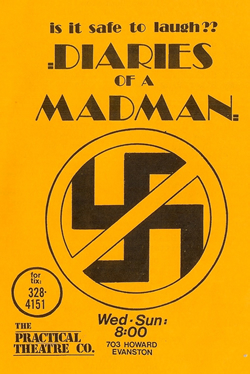
Diaries of a Madman
Written by Steven Rumbelow
Director: Steven Rumbelow
Diaries of a Madman was the only true flop of Steven's career. Not because the show was necessarily bad (see the Richard Christiansen review) but because the humor in this comedy was too raw for theatre audiences. Something Steven had miscalculated because of the liberality of stand-up. However, the lesson was that comedy theatre audiences and stand-upaudiences are different in character.
Practical Theatre had the distinction of working at Second City with a great cast of comic actors that included Brad Hall, Julia Louis Dryfuss, Paul Barrose and Jamie Baron. They invited Steven to create a new show at their storefront theatre in Evanston. He auditioned hundreds of people and came up with a great cast. The most famous hoax of the Hitler Diaries had just made big news and he had the notion that the show would take place in an asylum (Marat Sade style) in which all the inmates believed they were Adolf Hitler and competed to be the most atrocious as they wrote their preposterous diaries. Gems of sketches such as the George Lincoln Rockwell Klan Show, Brother Can you spare a Pina Colada?, The Biker's Prayer and The FDR Shuffle, which were intended to underline the ugliness of racism and the hidden Hitlers in modern society, may have flown in later years but at the time, provoked outrage in large sections of the audience.
Similarly, the promotions were seen as offensive by the Evanston community. Pins were handed out that were ban symbols over Swastikas. Older people chose not to see the ban symbols and completely missed the message, which was clearly to condemn nazis not promote them. The show had the worst public response of Steven's career and from that experience Steven learned to navigate audiences differently when it comes to parody and irony.
Review Archive
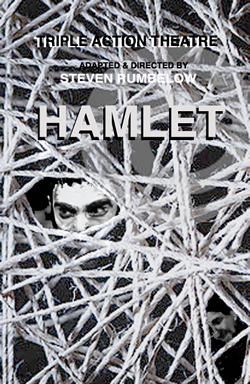
Hamlet
Adapted by Steven Rumbelow
Director: Steven Rumbelow
Steven had seen a parallel between Hamlet and a young man who had tried to escape over the wall in East Berlin when he was a kid. The image of that young man dying as he bled to death caught up in barbed-wire, in no man's land, had haunted him as a child. This led Steven to view Hamlet's Denmark as an inescapable web in which he is entangled and eventually engulfed.
The production was staged completely in a web above the audience's head with Hamlet in his famous soliloquy literally hanging by a thread in danger of falling to his death.
The show toured to 40 cities in Britain during 1972/73 and played in the West End for Triple Action's first time at the historic Arts Theatre which turned into a regular venue for Triple Action over the years.
The cast included Nigel Watson in the title role, Bjorg Arnadottir as Queen Gertrude, Bronson Shaw as the Spider King and Dave Walsh as Polonius.
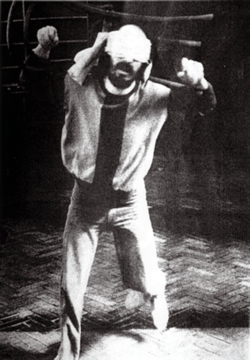
Kamp
Written by Steven Rumbelow
Director: Steven Rumbelow
Steven had noticed that getting trapped by a "talker" in a bar was the closest thing to being trapped that he could consider in his world. He felt "soft" because of it and compared to what people went through in wars, plagues and dictatorships, he believed his generation had no idea of what it must be like to be really trapped and subjected to inhumane practice. He decided to create a show that examined the nature of entrapment, imprisonment, sadism and abuse. He wanted it to be understood by all nationalities and stage it without any specific spoken language. It was based on interviews Steven had with survivors of concentration camps and Siberian work camps. Steven visited many concentration camps to learn about the subtleties of the subject.
The show played around the world to committed audiences and later became the basis for an experiment in linguistics when the Triple Action performed the show for primates at London Zoo. It started Steven on a series of experiments in language that led him into jungles and deserts all over the world.
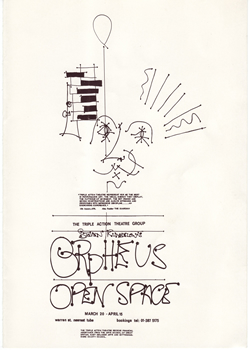
Orpheus
Written by Steven Rumbelow
Director: Steven Rumbelow
While in Kraków, Poland doing performances for Theatre Stu, Steven was standing on a balcony overlooking a bombed out site that hadn't been rebuilt since WWII. It was late and he saw an old lady walking towards him silhouetted against the lights bouncing off the wet street. She was dressed in black with a black headscarf carrying a black bag with some knitting needles poking out of the top. She moved with difficulty, obviously stricken with arthritis. It struck Steven that she was like a cross between one of the fates and the grim reaper. The knitting motif being the weaving of fate. The image resonated enough with Steven to inspire him to make a new version of Orpheus. Orpheus made music with an accordion and was played by Cengiz Saner who had played the Fool in the film version of King Lear and Mephistophilis in one of Steve's incarnations of Dr. Faustus. The show toured Europe and in London played at Charles Marowitz' Open Space Theatre. The final image was of Orpheus hanging by a helium-filled balloon floating in circles as he plays his final song.

Square Garden
Written by Steven Rumbelow
Director: Steven Rumbelow
Square Garden was produced in Chicago and Toronto. Actor James Zaza brought the story to Steven in Toronto with the proposition that it would make a great stage show. James was originally cast in the film Raging Bull as Joey LaMotta. Steven looked at the material and decided to make a stage production that explored the story of Jake LaMotta as a warrior-poet who faced and resisted a lifetime of abusive manipulations that challenged him on a regular basis: his abusive father, street gangs, boxing promoters, a predatory wife, fixed fights, the mob, imprisonment based on a lie and finally Hollywood. Hollywood started out as a dream factory that turned into an abusive employer who refused to pay for his hospital bills when he was hospitalized from rehearsals in the ring. He had been paid a few dollars for the rights to his book and was paid less than union minimum for training certain actors to box in his style. Then to add insult to injury the final film depicted him as a monster. Steven rehearsed the play at the CYO boxing gym in the heart of South Side Chicago. He wanted the cast to experience the realities of street that they would be depicting in the show. The show was staged at The Ivanhoe Theatre.
The production took the shape of a boxing match, between real boxers, which was fought every night with an outcome that was not determined until the end. The scenes of the play took place between the rounds. All the trimmings of a championship fight were afforded the production: a soprano singing the anthem, real appearances by past champions, telegrams received and read, etc. The show was dynamic with gritty depictions of the more balanced story of Jake. The show also included the story of James Zaza's involvement in the film and how the part was assigned to another actor. The two Italian clowns were not forgotten, they who desperately wanted to be filmmakers and would do anything as they stumbled their way over other people towards achieving that goal.
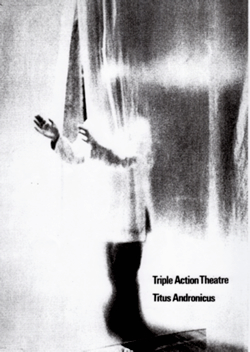
Titus Andronicus
Adapted by Steven Rumbelow
Director: Steven Rumbelow
Titus Andronicus is generally considered to be Shakespeare's worst play. Rumbelow feels this is partly due to the changes of the fashion in theatre of the fifties and sixties, which gave birth to more subtle styles like those of Osborne and Pinter, rather than any real deficiency in Shakespeare's writing.
Quoted from Rumbelow's Director's notes: "Titus is a sharply human play with an almost painful intensity. It deals with the consequences of revenge and the decaying process that can so easily take place within men and social structures. It needs a fresh approach. Go to a mission and count how many Titus' you see there. Listen to the bitter mutterings and aggressions related to past and present depths. You'll see Titus. In the play and in this adaptation, the seeds of Lear and Hamlet are very apparent. This production lays before the public a powerful and illuminating experience."
- Dr. Faustus
- King Lear
- Ulysses
- Moby Dick
- Bridal Polonaise
- Yes
- Solaris
- Richard III
- Other Notable Productions





